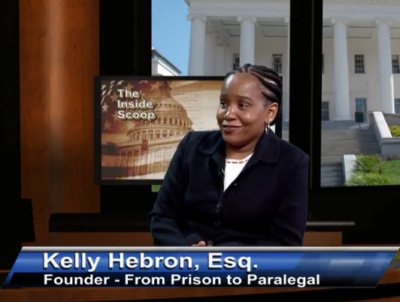From Prison to Paralegal with Kelly Hebron, Esq.
(Sept. 10, 2018) Catherine Read interviews Kelly Hebron, Esq. founder of From Prison to Paralegal, a recidivism reduction program that offers incarcerated individuals a path to a professional career via training to become paralegals. There are many openings in this field, with a variety of jobs that are well paying and stable. This six week training program, coupled with an internship opportunity, gives hope to individuals who are looking to forge a new path for themselves after they have paid their debt to society.
The first pilot class of this program was launched this past summer at the Fairfax Adult Detention Center. After collaborating with Sheriff Stacey Kincaid, Hebron identified 8 students who would be good candidates. The students needed to have basic reading, writing and comprehension skills equivalent to an 8th grade education. After the six week training, her program is designed to teach the students how to complete legal research, use critical thinking skills to analyze the cases, and then summarize their findings with proper legal writing. Hebron mentions that even if these students do not wind up with jobs as a paralegal, the skills they are learning are transferable and can be applied to a variety of positions, such as executive assistants or court clerks.
Hebron’s program is designed to be a gateway for students to move themselves forward. Her ultimate goal is to identify employers who have openings, and pair her students with the employers once the students have transitioned back into society. Before that happens, however, there are often many obstacles that these students may face. Some do not have any clothes to wear to an internship or even an interview. The student may lack resources for transportation to get to the job, especially if they do not have help from family or friends on the outside. In one instance, Sen. Tim Kaine’s office offered a full time opportunity for a work-release internship, but the candidates was restricted from traveling outside of the county so the job went unfilled. However, as the program grows and more opportunities arise, Hebron is confident that they can overcome many of these obstacles by partnering with other nonprofits who can help support the students.

In the second segment Catherine speaks with Mohammed, a graduate of the From Prison to Paralegal program. Mohammed admits that he made some very bad choices when he was younger, and was serving his time for his crimes. He admits that there were not very many opportunities to do anything productive while in prison. When he noticed the flyer posted about the program, he spoke with his Mom who encouraged him to apply. He enjoyed the classes, which reminded him of the work he did in high school, and said that attending the classes were the highlight of his day.
Upon gradation, he landed an internship opportunity with the American Civil Liberties Union ( ACLU) office. He absolutely loved going to work at their office, noting that the people he worked with were respectful, kind and warm. He never understood that work could be so enjoyable, and that working for a higher purpose could be so meaningful. Working at the ACLU has opened up his eyes to the many opportunities that await him. This program was transformative for Mohammed, and gives him hope for the future. He understands that his education cannot be taken away from him, and he envisions himself as gainfully employed once he is released.
As Hebron looks ahead to the future, she is encouraged by the success that she has had in Fairfax. She hopes to be able to bring this program to more students in the near future. The program lives under the social enterprise umbrella of Rising Tide, designed to bring opportunities for building a variety of skill sets for incarcerated individuals. Hebron is in the process of applying for grants and securing funding in order to grow the program. If you are interested in supporting her efforts, you can visit the website for more detailed information about how to get involved. She is looking for employers who are willing to hire individuals, along with donations to support the nuts and bolts of delivering the 6-week program, including money for textbooks and instructors. Hebron envisions endless possibilities, and hopes to grow the program in order to give hope to more incarcerated individuals.